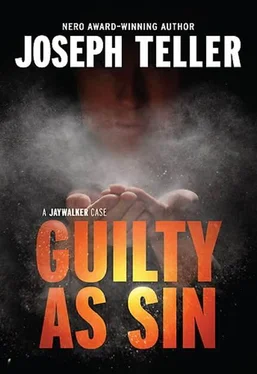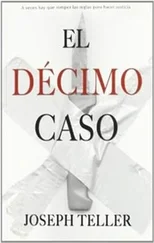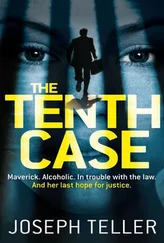Joseph Teller - Guilty As Sin
Здесь есть возможность читать онлайн «Joseph Teller - Guilty As Sin» весь текст электронной книги совершенно бесплатно (целиком полную версию без сокращений). В некоторых случаях можно слушать аудио, скачать через торрент в формате fb2 и присутствует краткое содержание. Жанр: Криминальный детектив, на английском языке. Описание произведения, (предисловие) а так же отзывы посетителей доступны на портале библиотеки ЛибКат.
- Название:Guilty As Sin
- Автор:
- Жанр:
- Год:неизвестен
- ISBN:нет данных
- Рейтинг книги:5 / 5. Голосов: 1
-
Избранное:Добавить в избранное
- Отзывы:
-
Ваша оценка:
- 100
- 1
- 2
- 3
- 4
- 5
Guilty As Sin: краткое содержание, описание и аннотация
Предлагаем к чтению аннотацию, описание, краткое содержание или предисловие (зависит от того, что написал сам автор книги «Guilty As Sin»). Если вы не нашли необходимую информацию о книге — напишите в комментариях, мы постараемся отыскать её.
Guilty As Sin — читать онлайн бесплатно полную книгу (весь текст) целиком
Ниже представлен текст книги, разбитый по страницам. Система сохранения места последней прочитанной страницы, позволяет с удобством читать онлайн бесплатно книгу «Guilty As Sin», без необходимости каждый раз заново искать на чём Вы остановились. Поставьте закладку, и сможете в любой момент перейти на страницу, на которой закончили чтение.
Интервал:
Закладка:
The problem was, where to begin?
A lawyer who comes into a case late finds himself at a serious disadvantage. Prior to his arrival, his adversary has been at work lining up witnesses, cementing and reconciling their stories, boning up on the law if necessary, and doing hundreds of other little things to maximize his head start. Which isn’t to say that Jaywalker’s predecessors on the defense side hadn’t been doing some of those things, too. But occasionally there’s a good reason-or even a number of good reasons-behind a client’s dissatisfaction with his representation.
Jaywalker had come into Alonzo Barnett’s case a full year and a half late, and had had not one predecessor, but three of them. The day after his second sit-down with Barnett, he took stock of what those lawyers had done, or failed to do, before his arrival.
First was the fact that none of them had made a serious attempt to get bail set in the case. While that might have made sense early on in the proceedings, at a time when Barnett had a parole violation detainer on him and couldn’t have gotten out in any event, there’d soon come a time when the detainer had been lifted. Barnett had had so little time remaining on his parole that the authorities had simply terminated him, marking his file closed with the notation “unsatisfactory adjustment.” Whether whoever was representing him at the time had noticed or not, or even bothered to check, was unclear. The result had been that on the new arrest, Barnett continued to be held in remand status. Jaywalker checked, of course, and when he discovered the omission, he went back in to see his client and bring him the news.
“Is there any amount of bail you could make?” he asked. “Anything at all?” He knew that even a defendant on a bad case with a bad record had a chance of getting a reasonable bail in Shirley Levine’s courtroom. And in addition to knowing his client would much prefer to be out than in, Jaywalker had selfish reasons of his own in mind. It’s much easier for the lawyer when he can meet with a defendant in his office than it is when he’s got to visit him in jail. Even a jail around the corner from the courthouse, like the Tombs. And after all, Barnett had been caught selling heroin, and in pretty substantial amounts. It was only logical to figure he might have some money stashed away somewhere.
But Barnett surprised him.
“Don’t get me bail,” he said.
Which marked a first for Jaywalker. Because the thing is, every detainee ever locked up in the history of the world wants to get out, with the possible exception of some homeless drunk in the middle of winter who’s happy to have “three hots and a cot” while he sleeps things off.
But Alonzo Barnett was neither homeless nor drunk, and instead of it being midwinter, it was mid-May. So Jaywalker was forced to ask him why he didn’t want to get out.
“It would be too hard on my daughters,” Barnett said. “I’ve told them to give up on me, that I won’t be coming out for a very long time, if ever. And it would be too hard on me, knowing I’d be living on borrowed time and would have to turn myself in sooner or later. I might decide to do something stupid, like run away. I couldn’t do that to my girls. Although,” he added, “I’ve got no place to run away to. ”
In the end, Jaywalker convinced Barnett that it made sense to have a bail amount set, even if he had no intention of ever trying to post it, and the following day went before Judge Levine and had her set bail at $25,000. If nothing else, it downgraded Barnett’s classification as a threat within the Tombs, freeing him up from having both his cell and his person subject to constant searches.
Another thing the trio of earlier lawyers had screwed up were the pretrial motions. They’d filed them-at least Lawyer Number 2 had-but done a pretty half-assed job. Long on paper but short on persuasion, they’d failed to recite sufficient grounds for the ordering of any evidentiary hearings prior to trial. The only thing that remained to be decided was how many of the defendant’s convictions the prosecutor would be able to bring out if Barnett were to take the stand. As for discovery, a lot of things had been asked for, but Daniel Pulaski had successfully resisted turning over just about all of them. As a result, Jaywalker knew the dates and approximate times and locations of the three sales, as well as the amounts of heroin involved in each. That and the fact that the prosecution claimed to know of no exculpatory material that might in any way materially assist the defense.
Not much to work with.
But in addition to being a compulsive overpreparer, Jaywalker was a former investigator. Not all of his time at the Drug Enforcement Administration had been spent buying narcotics. When he hadn’t been undercover, Jaywalker had been, like any other federal agent, an investigator. He knew how to slip a lock, tap a phone and bug a room. He could make a crime scene speak to him. He could walk into an apartment or pull over a car, and have a pretty good idea where the drugs were hidden. He was good with a camera and had a working knowledge of ballistics. He knew how to lift a fingerprint and match it to one on file. And he knew the back channels, the ins and outs of the criminal justice system.
It was that last piece of knowledge that he put to work now. And he began at the only place he could possibly think of.
Other than the cops and agents and state troopers who’d made the case against Alonzo Barnett and weren’t about to speak with a defense lawyer, there was only one person who was in a position to know anything at all about the facts. His name was Clarence Hightower, and he was the guy who’d called in the favor. According to Barnett, Hightower had been arrested only minutes after Barnett himself, though for possession, rather than sale.
Finding Hightower’s papers in the courthouse turned out to be a bit tricky, because they’d been sealed. The No Public Record stamp on the file could mean only one of three things, Jaywalker knew. First, that Hightower had been a juvenile or a youth, and Jaywalker knew he’d been neither. Second, that his case had ended with a dismissal or an acquittal. Or third, that he’d been convicted, but only of a violation, a minor noncriminal offense. Which struck Jaywalker as a bit unusual, seeing as Hightower’s criminal record was in pretty much the same league as Barnett’s, if not worse.
So he found a friendly clerk he’d known for years, gave him a sob story, and convinced the guy to look the other way for a few minutes. The clerk was taking a chance, but not all that much of one. Had they been caught, he knew Jaywalker would have taken the weight, explaining that he’d swiped the file without the clerk’s knowledge. The clerk knew this because that’s exactly the kind of thing Jaywalker had done in the past, whenever one of his little capers had been discovered. Even as it had led to a few of Jaywalker’s overnights at Rikers Island, it explained his reputation as a stand-up guy who could be trusted if the shit were to hit the fan.
One of the things Jaywalker always looked for in a court file was a photograph of the defendant. He liked to put a face on things. When he found Hightower’s mug shot, two things immediately jumped out at him. First, the guy wasn’t much to look at. Second, he’d never win a best-dressed contest, not in his stained and ratty blue denim work shirt.
So much for first impressions.
According to the file, Hightower had indeed been arrested on October 5, 1984. It seemed that he’d walked right into the middle of things, not realizing that the three or four guys in plainclothes surrounding Barnett were handcuffing him and reading him his rights. Jaywalker already knew this, having heard it from Barnett, who’d explained that Hightower had walked over intending to hit Barnett up for some of the money left over from the transaction, just as he had after the second one. Hightower had been promptly rewarded for his greed by being stood up against a wall and searched, and the search had revealed a tinfoil packet containing a small amount of white powder.
Читать дальшеИнтервал:
Закладка:
Похожие книги на «Guilty As Sin»
Представляем Вашему вниманию похожие книги на «Guilty As Sin» списком для выбора. Мы отобрали схожую по названию и смыслу литературу в надежде предоставить читателям больше вариантов отыскать новые, интересные, ещё непрочитанные произведения.
Обсуждение, отзывы о книге «Guilty As Sin» и просто собственные мнения читателей. Оставьте ваши комментарии, напишите, что Вы думаете о произведении, его смысле или главных героях. Укажите что конкретно понравилось, а что нет, и почему Вы так считаете.












